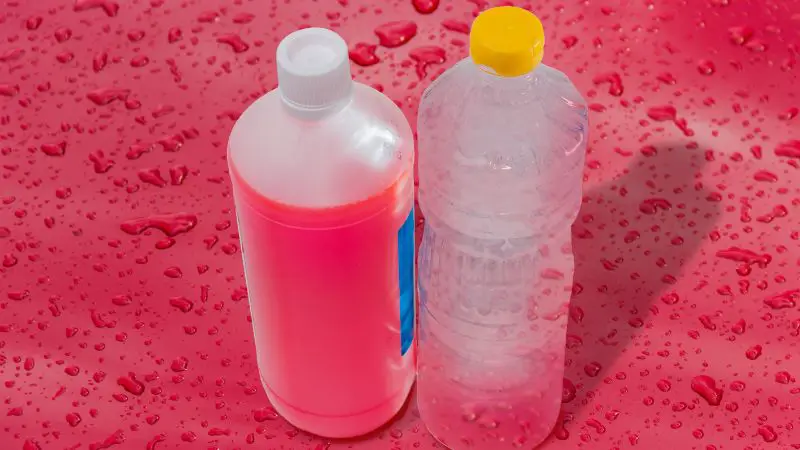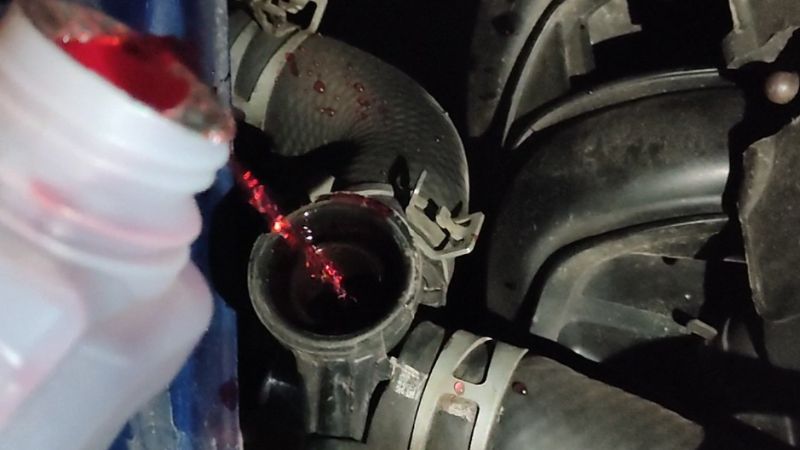When it comes to automotive fluids, it can be hard to keep them all straight.
You know you need engine oil, brake fluid, and transmission fluid; but what about coolant and antifreeze? It’s true that these two things often get mixed up, but there are some key differences between them.
In this article, we’ll try to share the key differences between coolant and antifreeze and help you determine which option is better for your car.
By the end of this article, you should have no problem deciding between Coolant VS Antifreeze when it’s time to refill your vehicle’s cooling system. So, let’s get started with it.
What Is Antifreeze?
Antifreeze is a type of liquid primarily used in automotive cooling systems to reduce the freezing point and increase the boiling point of the liquid. It typically consists of ethylene glycol or propylene glycol, water, and some additional corrosion-inhibiting chemicals.
The freezing point of antifreeze can range from -34°F (-36°C) to as low as -84°F (-64°C), depending on its composition. The boiling point also varies depending on the makeup but is generally around 225 to 300 degrees Fahrenheit.
Antifreeze is also compatible with most materials used in automotive cooling systems, like plastics, metals, and rubber hoses. Although it should not be mixed with other coolants or lubricants as they can break down into a corrosive fluid that will damage your engine.
What Is a Coolant?
You may think about what is Coolant or what is Coolant used for; right?
Coolant is a term used to refer to liquid in automobiles that help keep the engine from overheating by absorbing heat and dispersing it back into the surrounding environment.
They are composed of several components including water, glycols, organic acids or salts, rust inhibitors, anti-foam agents, pH stabilizers, and dyes.
The main function of coolants is to regulate temperatures in the cooling system and prevent corrosion from forming inside the engine. The freezing point of coolants is typically -36°F with a boiling point of 265°F-271°F depending on concentration levels.

How Does Coolant or Antifreeze Work?
As you purchased as a pre-mixed solution or a concentrate you can mix at home, antifreeze lowers the freezing temperature and raises the boiling temperature of the fluid circulating the engine.
Combined with water, antifreeze also helps lubricate internal engine components.
Engine coolant is usually a 50/50 split of antifreeze and distilled water. However, some coolants are made with a 70/30 split of antifreeze and water.
They are designed to resist corrosion and are usually a little more expensive than their 50/50 counterparts. You can mix antifreeze with distilled water in any of these ratios.
Check:How Much Coolant Do I Need For My Car?
Key Differences between antifreeze vs coolant?
When it comes to car maintenance, keeping your engine from overheating is a top priority.
One way to prevent overheating is by using a coolant or antifreeze. But many people use these terms interchangeably without realizing that they are not the same thing.
Here, we’ll try to explain the difference between coolant and antifreeze and why it’s important to use the right one.
Composition
It’s important to know the composition of your coolant and antifreeze. It is because some coolants and antifreeze are not created equal.
Coolants look and feel like water, but they’re made of a combination of water and proprietary glycol inhibitors.
Inhibitors are added to prevent corrosion, scale build-up, rust, and other damage from hard water. Depending on the brand, coolants may also contain dyes so you can easily identify if it is contaminated.
Antifreeze is a type of coolant that has additional ingredients like alcohol or silicates which helps it handle extreme temperatures better than coolant alone.
These additional ingredients also inhibit corrosion over time, but they can leave deposits in your engine that will eventually damage it if not changed regularly.
Function
One of the key differences between coolant and antifreeze is its function.
Coolant’s primary task is to keep your vehicle from overheating. It does this by dissipating heat from the engine during hot summer days.
On the other hand, Antifreeze has a much more important job. It’s designed to prevent your engine from freezing in cold weather. In many climates, both coolant and antifreeze are essential for optimal vehicle performance.
Coolant typically consists of water mixed with an ethylene glycol-based formulation that prevents it from freezing up when temperatures drop.
This formulation also helps reduce corrosion and scale build-up in your car’s cooling system.
Antifreeze is typically made of a propylene glycol-based formula that includes additives to help protect against corrosion and rust. It also provides lubrication for components in the cooling system.
Boiling Point
If you’re comparing coolant vs antifreeze, you’ll want to take boiling point into account.
Coolant and antifreeze have a higher boiling point than water. The exact boiling point will differ based on the type of liquid you use.
Usually, coolant has a maximum boiling point between 300-400 degrees Fahrenheit, while antifreeze has a boiling point between 225-300 degrees Fahrenheit.
However, some coolants come with a higher water content, which makes them more compatible with certain systems.
These high-water-content coolants have lower boiling points than regular coolants but are still higher than regular antifreeze so they can provide more protection for your engine against overheating.
So, when comparing coolant vs antifreeze, consider their boiling points. It will help you choose a product that best fits your vehicle’s cooling system and helps keep your engine safe from damage caused by heat build-up.
Color
Did you know that coolant and antifreeze come in different colors? Depending on your vehicle, it may require one or the other. So, what’s the difference?
Now, the question is, what Coolant color is? Coolant is typically a neon green color and is designed to protect your engine from corrosion, while also regulating its temperature.
This is important in the hotter months because it prevents your engine from overheating. It’s also important in colder months, as coolant helps prevent ice crystals from forming and damaging your engine.
Antifreeze has a more varied range of colors than the coolant, including red, orange, yellow, and green.
The main purpose of antifreeze is to regulate the temperature within engines under extreme weather conditions both hot and cold. It also helps protect from corrosion caused by magnesium chloride salt when used during winter months.
Depending on your vehicle’s specifications, you may need one or the other. So, check your owner’s manual before making any changes.
Antifreeze vs Coolant
So, which one is the winner? Which one should you choose between Coolant VS Antifreeze?
The answer is not so simple. It all depends on what kind of engine you have and its cooling system.
If you’re using an older engine model, then antifreeze is the best option for you. It’s more acidic and therefore more effective at corrosion prevention. It can also withstand extreme cold weather.
On the other hand, if you’re using a newer engine model with a closed-loop cooling system, coolant is the way to go.
Its low freezing point and higher boiling point make it better at regulating your engine’s temperature in all types of weather conditions, while still providing adequate protection against corrosion and rust.
Ultimately, your mechanic or car manual can provide the best advice on which fluid to use in your specific situation. Make sure to always follow their instructions for optimal engine performance and longevity.
Antifreeze vs Water
Can I use water as an antifreeze? The answer is very simple because we already discussed that antifreeze has a higher boiling point and lower freezing point than water. That’s why if you use water instead of antifreeze that will start boiling or freezing earlier time than antifreeze which may cause of engine to fail in some hot or cold temperature situations. So if you think about antifreeze vs water then without any doubt you should select antifreeze, though antifreeze is more costly than water.
How Often Should I Change My Engine Coolant?
Engine Coolant also known as antifreeze is responsible for regulating the temperature of your engine and preventing it from overheating. Over time, the coolant can become contaminated with debris and lose effectiveness, making it important to change it regularly.
The frequency with which you should change your engine coolant depends on the type of coolant and your vehicle’s manufacturer’s recommendations. Most manufacturers suggest changing your coolant every two to three years, or every 30,000 to 50,000 miles.
Check Also: What Can I Do If I Accidentally Put Coolant in Engine oil?

Which Coolant Is Perfect for Use in a Car?
You already got some ideas about Coolant. But some people want to know what coolant to use in my car.
The simple answer is, a ratio of 50% antifreeze and 50% water is considered the perfect coolant for car engines.
For most modern cars with aluminum engines, a coolant that contains ethylene glycol is recommended. This type of coolant offers excellent heat transfer properties and provides good protection against corrosion. However, for older cars with cast iron engines, a coolant that contains a mixture of ethylene glycol and water is typically recommended.
It is also important to choose a coolant that is compatible with your car’s cooling system. This information can usually be found in your car’s owner’s manual or by consulting with a qualified mechanic.
Frequently Asked Questions
Q. What is the Antifreeze Coolant price?
Antifreeze coolant prices vary depending on the brand, quantity, and type of coolant. On average, you can expect to pay between $100 and $200 for a standard coolant change.
Q. What are the major differences between Coolant VS Water?
Coolant contains additives to prevent corrosion, reduce cavitation, and increase boiling point, whereas water lacks these properties. Also, Coolant has a longer lifespan and better heat transfer capabilities but is more expensive than water.
Q. How do I know if my car needs coolant or antifreeze?
Check your car’s owner’s manual to confirm the type of coolant/antifreeze needed. If low, top off with a 50/50 mixture of antifreeze and distilled water. If you’re in doubt; then consult a mechanic.
Final Thought
You already got some ideas about the differences between Coolant VS Antifreeze. Both coolant and antifreeze are beneficial to your car’s system when used correctly.
However, coolant is the better option when it comes to performance and cost-effectiveness. Not only is coolant a more efficient heat transfer medium, but its water-glycol formulation also provides superior corrosion protection and longer service life, making it the more cost-effective choice overall.
With its better temperature control, safer properties, and improved efficiency, coolant is the clear winner when comparing coolant and antifreeze.
Read Also: Can You Use Water As Coolant?
